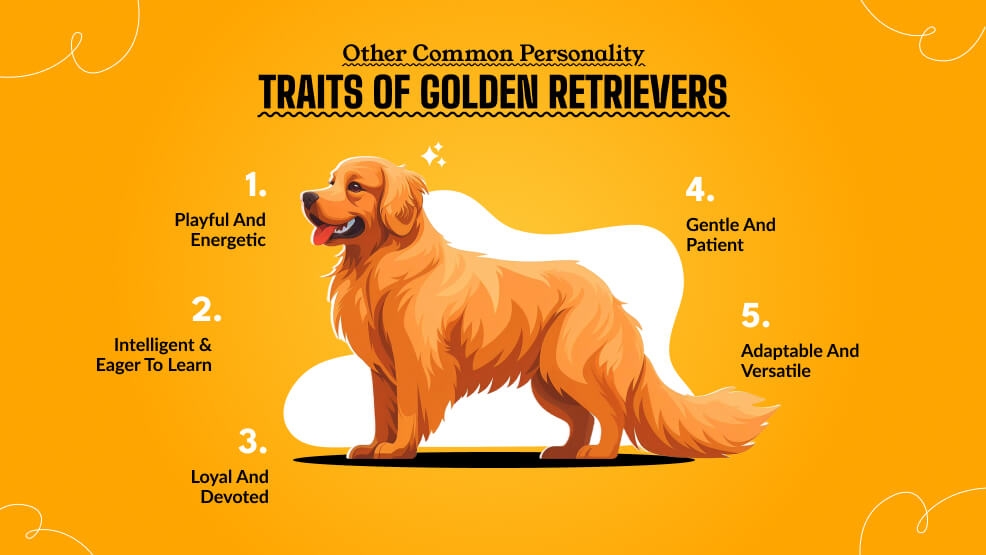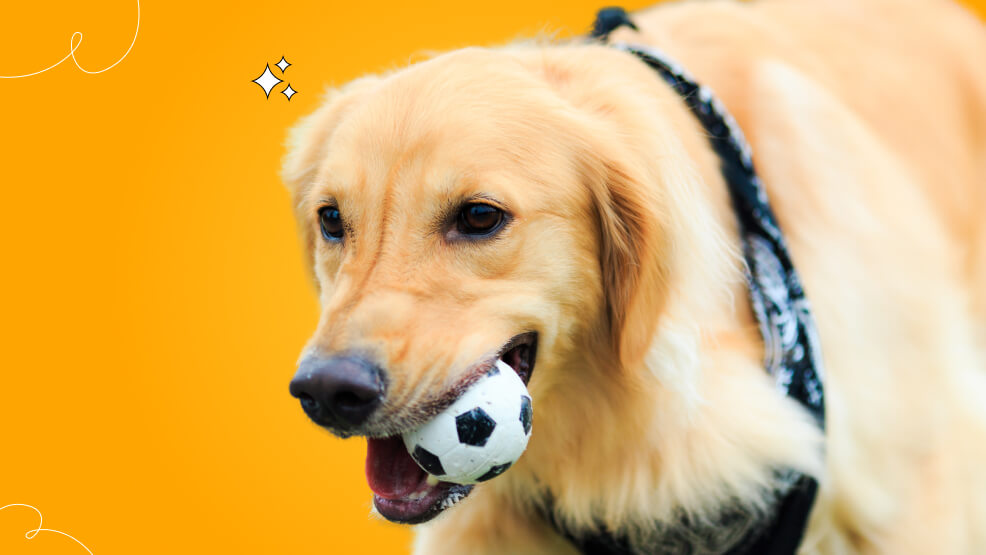Are Golden Retrievers Aggressive? Personality Explained!


The Golden Retriever is a beloved breed that has captured the hearts of dog lovers worldwide. With their gorgeous golden coats, friendly demeanor, and unwavering loyalty. These canine companions can quickly become a part of any family.
However, beyond their striking appearance lies a unique temperament that sets them apart from other breeds. In this comprehensive guide, we’ll delve into the fascinating personality traits of the Golden Retriever. Let’s explore what makes them such cherished companions.
Are Golden Retrievers Aggressive?

Golden Retrievers are generally known for their friendly and gentle nature. But like any dog breed, they can exhibit aggressive behavior under certain circumstances. Here’s a breakdown of the factors that can influence their behavior:
Factors Contributing to Aggression in Golden Retrievers:
- Poor Breeding: Inbreeding or irresponsible breeding practices can lead to dogs with unstable temperaments, increasing the likelihood of aggression.
- Lack of Socialization: If a Golden Retriever is not exposed to various people, animals, and environments during their puppyhood. They may become fearful or reactive towards unfamiliar stimuli.
- Inadequate Training: Without proper training, a Golden Retriever may not learn appropriate boundaries and behaviors, leading to potential aggression.
- Medical Issues: Pain or discomfort from underlying health conditions can cause irritability and aggression in any dog, including Golden Retrievers.
- Fear or Anxiety: A Golden Retriever may become aggressive if they feel threatened or anxious in certain situations.
How To Manage Aggression In Golden Retrievers?
Here are some steps that you can follow to manage and prevent aggression in Golden Retrievers.
- Responsible Breeding: Choose a reputable breeder who prioritizes the health and temperament of their dogs.
- Early Socialization: Expose your Golden Retriever puppy to various people, animals, and environments to help them develop a well-adjusted personality.
- Positive Reinforcement Training: Use positive reinforcement techniques to teach your dog obedience and good behavior.
- Regular Veterinary Check-ups: Ensure your dog’s physical and mental health is well-maintained.
- Address Underlying Issues: If you notice signs of aggression, consult a veterinarian or a qualified animal behaviorist to identify and address any underlying causes.
Remember, Golden Retrievers are generally not prone to aggression. It’s important to be aware of the potential factors that can trigger such behavior. By taking proactive steps to socialize, train, and care for your Golden Retriever. Furthermore, you can minimize the risk of aggressive tendencies. It ensures a happy and harmonious relationship with your furry friend.
Exploring The General Temperament Of Golden Retrievers

Golden Retrievers are widely renowned for their affectionate, gentle, and trustworthy nature. Their temperament is often described as one of the breed’s most endearing qualities. It makes them a popular choice for families and individuals seeking a loyal and loving companion.
At the core of the Golden Retriever’s temperament is a strong desire to please their owners. This trait stems from their history as hunting companions, where they were bred to work closely with humans and respond to commands. This eagerness to please translates into a highly trainable breed, responsive, and eager to engage in activities with their human family.
The Friendly and Sociable Nature of Golden Retrievers
One of the most prominent personality traits of Golden Retrievers is their friendly and sociable nature. These dogs thrive on human interaction and are known for their willingness to greet familiar and unfamiliar people with wagging tails and affectionate leans.
Their outgoing personalities make them excellent companions for families and individuals. You can enjoy an active social life, as they easily adapt to new environments and situations.
However, it’s important to note that while Golden Retrievers are generally friendly, proper socialization and training. It is essential to ensure they maintain appropriate boundaries and respect personal space.
Other Common Personality Traits of Golden Retrievers

In addition to their friendly and affectionate nature, Golden Retrievers possess several other endearing personality traits. These traits make them such beloved companions:
Playful and Energetic
Golden Retrievers are known for their zest for life and love of playtime. Whether chasing a ball, swimming, or engaging in interactive games, they have an abundance of energy. They need to be channeled through regular exercise and mental stimulation.
Intelligent and Eager to Learn
With their high intelligence and desire to please their owners, Golden Retrievers are quick learners. They can excel in various training activities, from obedience to agility competitions.
Loyal and Devoted
Once a Golden Retriever bonds with their human family, they become fiercely loyal and devoted companions. They thrive on spending time with their loved ones and often follow their owners around the house. You can seek companionship and attention.
Gentle and Patient
Despite their size and energy levels, Golden Retrievers are known for their gentle and patient nature. it makes them excellent companions for children and elderly individuals alike.
Adaptable and Versatile
Whether living in an apartment or a sprawling countryside home, Golden Retrievers are adaptable. They can adjust to various living situations, as long as their exercise and companionship needs are met.
Golden Retrievers as Family Pets

The Golden Retriever’s temperament makes them ideal for families with children. Their gentle and patient nature allows them to tolerate the occasional rough play or loud noises. It comes with having young children around. Additionally, their affectionate and loyal personalities make them devoted companions who will form strong bonds with every family member.
When introducing a Golden Retriever to a household with children, it’s crucial to supervise interactions. It teaches the dog and the children how to interact respectfully. With proper guidance, Golden Retrievers can become cherished playmates and protectors for children. They will create lasting memories and foster a love for animals from an early age.
In addition to their compatibility with children, Golden Retrievers are generally well-suited to living with other pets, including cats and dogs. Their friendly and sociable nature often allows them to coexist peacefully with other animals. It provides they are properly introduced and socialized.
Golden Retrievers as Therapy and Assistance Dogs

Beyond their role as beloved family pets, the Golden Retriever’s temperament has also made them invaluable in various therapy and assistance roles. Their calm and gentle demeanor and eagerness to please make them well-suited for tasks. It is guiding the visually impaired, providing emotional support, or working as therapy dogs in hospitals and nursing homes.
In these roles, Golden Retrievers showcase their adaptability, patience, and ability to remain composed in various environments. Their friendly and non-threatening nature helps put people at ease, making them excellent companions for those needing emotional or physical support.
How to Nurture and Develop a Positive Temperament in Your Golden Retriever

While Golden Retrievers are known for their inherently friendly and gentle temperament, nurturing these traits early is essential for developing a well-rounded and well-behaved companion. Here are some tips to help you foster a positive temperament in your Golden Retriever:
Early Socialization
Expose your Golden Retriever puppy to various sights, sounds, and situations in a positive and controlled manner. This helps them develop confidence and adaptability, reducing the likelihood of fear or aggression in unfamiliar environments.
Positive Reinforcement Training
Use reward-based training methods, such as treats and praise, to reinforce desired behaviors. Golden Retrievers respond well to positive reinforcement due to their eagerness to please and food-motivated nature.
Provide Mental Stimulation
In addition to physical exercise, Golden Retrievers thrive on mental stimulation. Engage them in interactive games, puzzle toys, and training sessions to keep their minds active and prevent boredom or destructive behaviors.
Establish a Routine
Golden Retrievers thrive on routine and consistency. Establish a predictable schedule for feeding, exercise, and playtime. It can help reduce anxiety and promote a sense of security.
Provide a Loving and Nurturing Environment
Golden Retrievers are highly social and thrive on human companionship. Ensure they receive ample attention, affection, and quality time with their human family. It fosters a strong bond and a positive temperament.
Following these tips and providing a nurturing and supportive environment can help your Golden Retriever relax. It develops and maintains their friendly, gentle, and affectionate temperament, ensuring a lifetime of joy and companionship.
The Golden Retriever’s temperament is a true testament to the breed’s enduring popularity. They have become cherished companions in countless households worldwide. Their friendly and affectionate nature, intelligence, loyalty, and adaptability. It makes them an excellent choice for families, individuals, and even those needing therapy or assistance.









Leave A Comment